TransJakarta grew from 12 km to 251 km in 19 years, becoming the world's largest bus rapid transit (BRT) network, carrying one million passengers per day.
Ananda Putra Fajar was one of the first to test the BRT system when it was launched in the capital Jakarta in 2004. The Indonesian capital was notorious for its frequent traffic jams and air pollution.
In search of a solution, Jakarta began developing a Bus Rapid Transit (BRT) system called TransJakarta in 2004, a 12-kilometer network of buses running on dedicated lanes. Nineteen years later, Fajar has become increasingly dependent on the BRT to get to work.
TransJakarta has now grown into the world's largest BRT system, with a total length of 251 km, carrying one million passengers per day in a city of 11 million people.
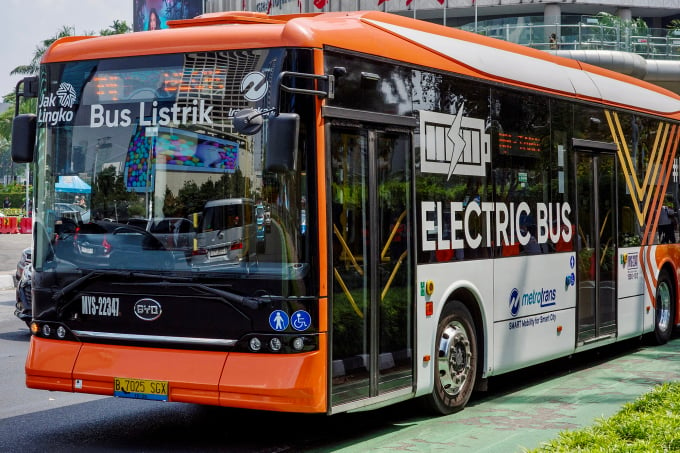
Electric buses on the streets of Jakarta on June 7. Photo: AFP
"I feel very comfortable traveling by TransJakarta," said Fajar, 29, a recruiter working in Jakarta's financial and economic hub. "There's no need to use personal vehicles anymore."
The BRT fare is 3,500 rupiah ($0.23) per ride, which has been unchanged for 19 years thanks to government subsidies. The network, which consists of hundreds of minibuses and cars, covers 88% of Jakarta’s residential areas and its vast satellite towns.
The BRT network now has 240 routes operating across the city, up from 22 10 years ago. The number of buses has also quadrupled to 4,642.
As the BRT system expanded, ridership increased, from 100 million in 2013 to more than 264 million in 2019. Mutia Zakia, a frequent BRT passenger, said she had given up all other forms of transportation.
"I gave up my motorbike and completely trusted TransJakarta because there are many routes to choose from," Zakianois said. "It's cheaper, and there's no congestion because the BRT has its own lane."
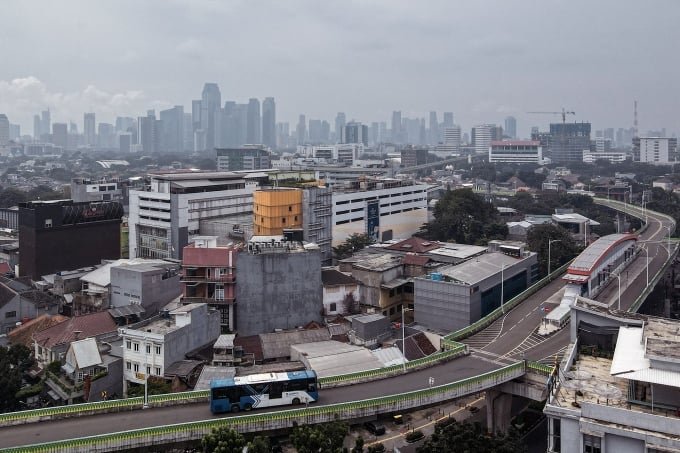
A TransJakarta bus travels on a dedicated route in Jakarta on May 21, 2022. Photo: AFP
"When there are 40 passengers on the bus, it means there are 40 fewer private vehicles on the road, which means less carbon emissions. With future advances, such as the use of electric buses, emissions will be reduced even more," said Gonggomtua Eskanto Sitanggang, acting director of the Indonesian Institute for Transport Development Policy (ITDP), which is supporting TransJakarta.
However, private vehicles in Jakarta are also growing rapidly, with 16.1 million motorcycles and 4.1 million cars, according to the Greenpeace and Resilience Development Initiative 2022 report. Jakarta's transport-related greenhouse gas emissions were estimated at more than 22.8 million tons in 2020, of which 15.8 million tons were from private motor vehicles.
The city is hoping BRT will help it reach its 2050 net zero emissions target and wants to transition quickly to an electric bus system, with a goal of 100% electric buses by 2030.
"We are operating 74 electric buses and the data from the past 18 months shows that electric buses are effective in reducing pollution, operating and maintenance costs," said Daud Joseph, TransJakarta's director of operations and safety.
However, the cost of the transformation is a concern. At the current growth rate, the system will need 10,000 buses. Gonggom said TransJakarta needs to explore other business models and encourage private participation to speed up the plan.
Some have suggested that the Indonesian government reallocate subsidies for private electric vehicles to support public transport to reduce traffic congestion and greenhouse gas emissions.
"TransJakarta cannot operate alone. There needs to be a policy push from the government to encourage people not to use personal vehicles," he said.
Joseph hopes that more countries will compete in the field of electric bus production to reduce costs, and admits that the government should consider issuing more preferential policies for electric buses, in addition to tax incentives when buying vehicles.
"Switching to personal electric vehicles can reduce air pollution but not traffic congestion. Only using public transport can solve both problems," he said.
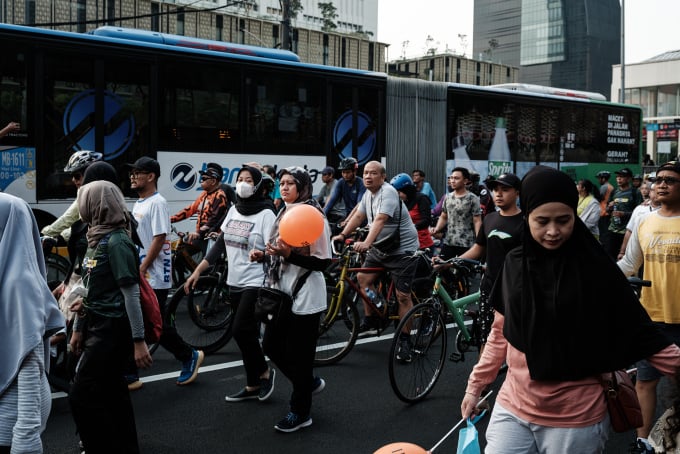
People walk along a BRT lane during car-free hours from 6am to 10am every Sunday in Jakarta. Photo: AFP
The growth of TransJakarta shows that a useful public transport system can benefit everyone.
"TransJakarta has built a large, loyal user base because many people have no other affordable options. The bus is for everyone regardless of wealth," said Fani Rachmita, an expert at ITDP.
Hong Hanh (According to Guardian )
Source link



![[Photo] Looking back at the impressive moments of the Vietnamese rescue team in Myanmar](https://vstatic.vietnam.vn/vietnam/resource/IMAGE/2025/4/11/5623ca902a934e19b604c718265249d0)
![[Photo] "Beauties" participate in the parade rehearsal at Bien Hoa airport](https://vstatic.vietnam.vn/vietnam/resource/IMAGE/2025/4/11/155502af3384431e918de0e2e585d13a)







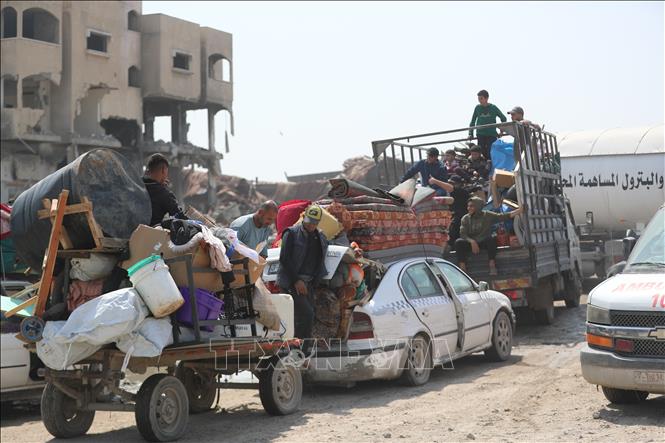


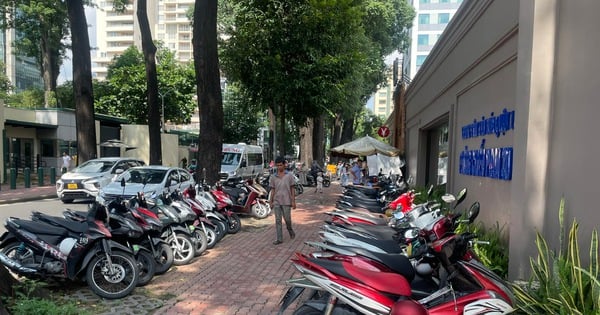

















![[Photo] Summary of parade practice in preparation for the April 30th celebration](https://vstatic.vietnam.vn/vietnam/resource/IMAGE/2025/4/11/78cfee0f2cc045b387ff1a4362b5950f)









































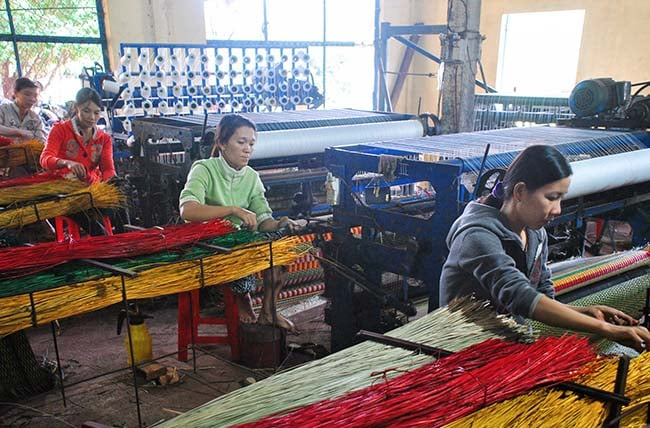






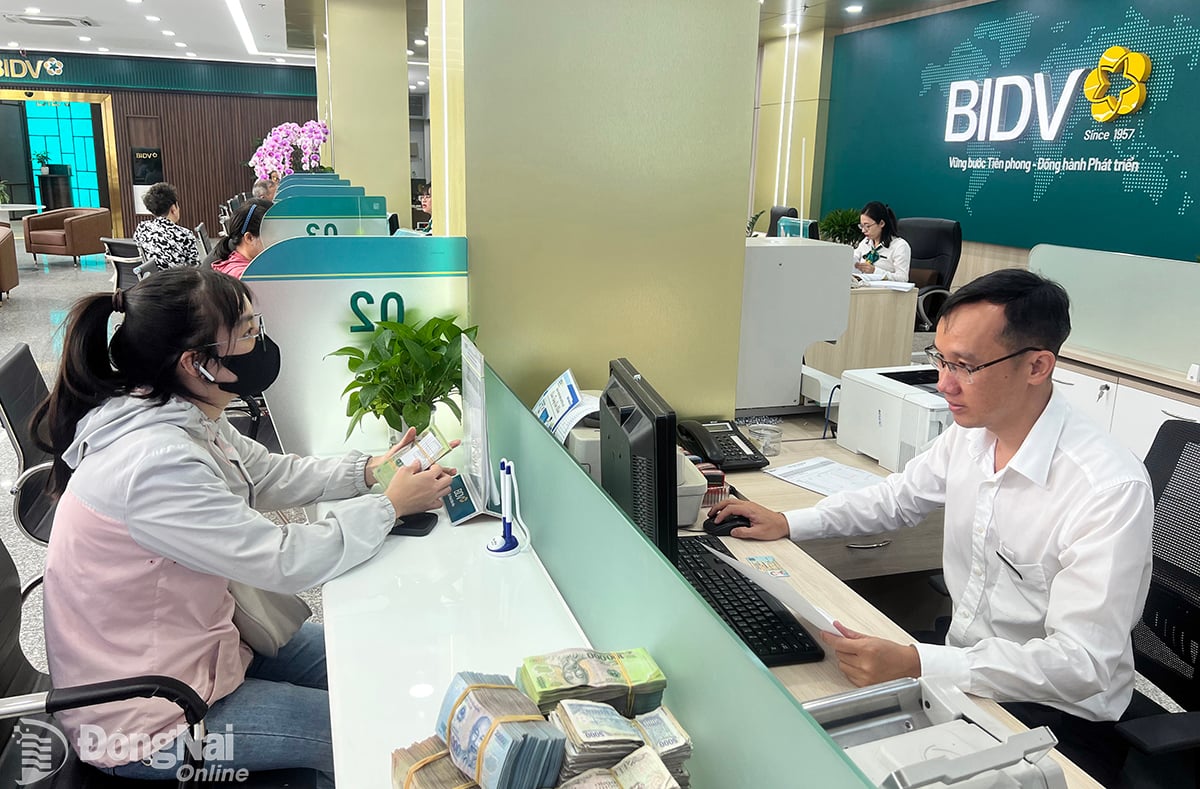











Comment (0)